Hurricane Andrew: Florida residents remember the storm
- Published
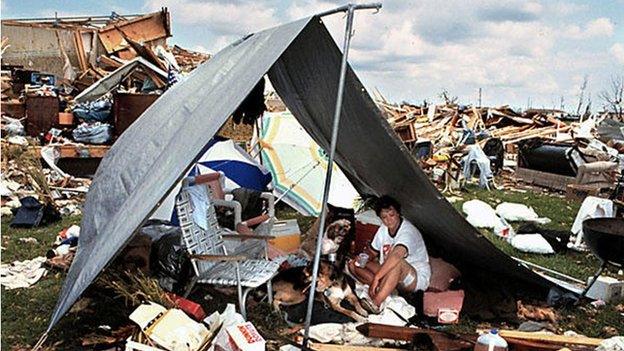
The hurricane destroyed all the mobile homes in Homestead and made many other dwellings unliveable
Twenty years after Hurricane Andrew, residents of Homestead, Florida, recall the storm that changed their life.
With its well-preserved historic buildings and a typical south Florida small-town atmosphere, Krome Avenue is one of the most important landmarks in the city of Homestead.
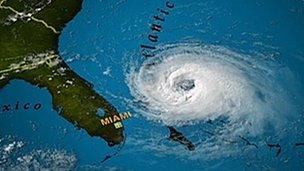
Homestead and other small south Florida towns bore the brunt of Andrew's power
The clean and peaceful street bears no resemblance to the way it looked on 25 August 1992, a few hours after Hurricane Andrew - a powerful category five storm - made landfall. Striking in the dead of night, the storm wrought unprecedented havoc on the area.
At the time, Andrew was considered the most costly tropical Atlantic cyclone in US history. With damages amounting to $25bn (£15.8bn), it left up to 250,000 people homeless and claimed 26 lives, according to the US National Hurricane Center.
Twenty years on, BBC Mundo's Jaime Gonzalez and Thomas Sparrow return to Homestead to find out how residents remember that day, and how have they recovered from the ordeal.
STEVE BATEMAN, 56, Mayor of Homestead
Andrew was devastating. Ten thousand people left in the first 30 days.
My house was 50% destroyed and my business took a good hit too.
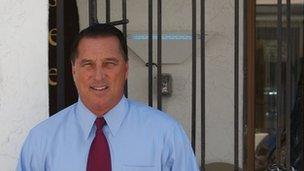
I remember the morning I [found] looters in my warehouse. They were walking out with the generator and some other tools and things.
Martial law was imposed. Everybody was carrying a gun. The military was brought in and there was a curfew. You were not allowed out after dark, and if you were you were arrested.
For the first three months we did nothing but go from house to house, supporting friends to get back some quality of life, getting water out of their homes and ripping up the carpets.
I think Homestead should be remembered for its tenacity, its willingness to hang on and fight to get back on its feet.
We are now much better prepared for hurricanes. After Andrew, the construction standards changed tremendously. We now have one of the most stringent building codes in the country.
RUTH CAMPBELL, 92, runs the Historic Town Hall Museum
Everybody will tell you that a hurricane sounds like a train hurtling towards you and you feel like it is going to hit at any moment. And that's how it sounded to me.
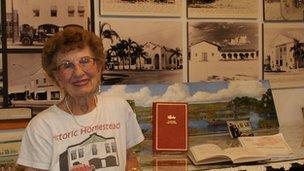
I had four grandchildren with me at the time and I just kept telling them that everything was going to be all right.
At the time, I was part of the city council, which was turned into the main communication centre. The most important thing was answering questions: Where can I get fuel? Where can I get ice? Ice was the most precious thing those days!
Later we had one of the biggest outdoor barbecues ever to cook our food. We already knew we wouldn't get electricity back for a while.
It was like being on an island full of trash. There were piles at the roadside and it was weeks before it was cleared up.
The city manager said that it could take up to two years to recover. Can you imagine? That's how dumb we were! We thought that all will be over in two years. That thought really made us feel good.
It was really a good 10 years. There was so much to do.
ROBERT BARNES, 62, third-generation local architect
My brother came over the day before the storm. I was busy refurbishing my house, and he asked why I was doing that when it wouldn't be there the following day. He worked for South Florida Water Management, so he knew more than a lot of us did.
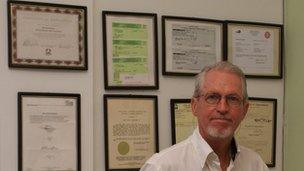
The only thing I received from my grandmother's inheritance was an antique mahogany piano. But during the hurricane I pushed it against the sliding glass door [for support].
The walls starting moving. My boat was bashing against the wall. We moved into the back bedroom. Right after we shut the door, the walls inside the hallway caved in.
We picked everything up and went to my office where we made a camp with drafting tables.
But I also had a bit of good luck, because two days later when I went home, my phone rang. I realised I had a phone! I had a phone that worked!
The next morning, a friend brought a propane generator, so I had air conditioning, lighting and phones.
I was up and working, but I didn't have any clients. So I asked a designer to make a sign to put on top of my roof. People started coming through the door and I had more work within weeks than I could ever imagine.
I think that Andrew was a soul-cleansing experience. We are still redefining who we are.
JAMES ACCURSIO, 62, owner of the Capri Restaurant
During the hurricane our two-story house was shaking and water came pouring in, so we decided to go downstairs. My wife, two young daughters, two dogs and two cats and I huddled underneath the stairs. It was one of the most terrifying moments of my life.
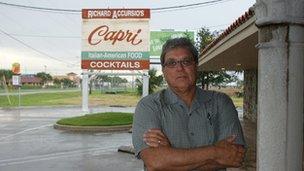
When the hurricane passed we went outside and it was like being in a science-fiction movie. Every landmark that you had known - trees, telegraph poles, street signs, houses - was knocked flat.
One of my main worries was the food we had in our restaurant. We had just had a shipment and we didn't know how long it would take to get the power supply back. We did not have a generator, so we could not keep it for long.
So after a day or so, we just sat out in front and gave the food away to whoever wanted it. We were giving away ribs, prime steaks and veal. We became popular really fast.
It took us about a day to get rid of everything perishable. We opened the restaurant within 30 days.
After the hurricane, the customer base totally changed. A lot of people left the area. I never thought of leaving. I love it here and I always felt part of the community. I wanted to rebuild it.
It was a lot of hard work and sleepless nights. It's a life-changing experience.
Am I glad I went through it? Not necessarily, but I am proud of what I've done.